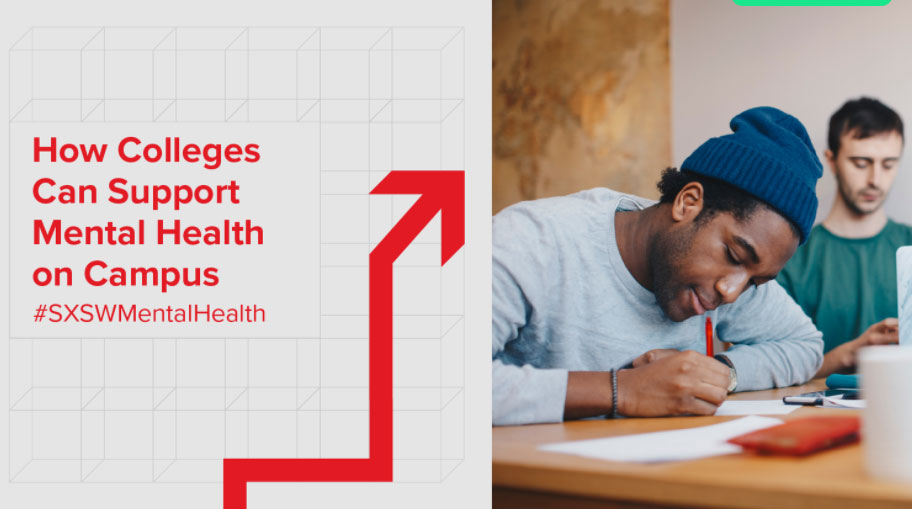My Account Details
SXSW EDU Mental Health on College Campuses
At this year’s SXSW EDU conference, McGraw Hill has organized a panel to share research-based practices to help college students maintain their emotional well-being.

At this year’s SXSW EDU conference, McGraw Hill has organized a panel featuring experts who will share examples of programs and research-based practices that can help college students maintain their emotional well-being and stay healthy—whether they’re learning in person or online.
With the help of two of the panelists—Diana Cusumano of The Jed Foundation(JED) and Lynsey Listau of Pensacola State College—we’ve put together the latest data on student mental health and some tips for schools as they work to improve mental health support on campus.
This topic is of importance as we know that mental health issues are prevalent and increasing for so many of our nation’s young adults. Recent data to support this shows that suicide rates among our young people in the U.S. have risen over the past 18 years (CDC, 2020). We also know that our students of color, LGBTQ+ youth, international students, first-generation students, and other potentially marginalized populations face additional mental health stressors (The Clay Center for Young Healthy Minds, 2021; JED Proud and Thriving Literature Reviews, 2021).
If you happen to be attending SXSW EDU this year, be sure to attend the #SXSWMentalHealth session on March 8 at 11 am.
Below are some areas that the panelists will be discussing in this upcoming session:
How schools can improve support for students
The responsibility of helping the emotional wellbeing of students can't fall on counseling/health services staff alone. To create a true culture of care on campus, supporting the mental health of students must be a campus-wide priority implemented through a comprehensive, public-health approach.
- Achieve campus buy-in
To implement a comprehensive mental health plan it is critical to have support from all campus stakeholders. Pensacola State College uses both student stories and quantitative data to create the buy-in to receive financial support from administrators and also to encourage faculty and staff to refer students to their wellness team.
- Raise awareness and accessibility of counseling services and community resources
It is imperative that institutions have a visible and easy way for faculty, staff, and students to refer students to counseling services or to a Care Team/Behavioral Intervention Team on campus. Pensacola State College adopted an online referral system four years ago that allows the campus community to refer students to the wellness team anywhere they have access to the internet. The referral reports come to the mental health support team immediately, and the team reaches out to the student of concern in 24-48 hours.
- Provide training and opportunities for peer support
Both faculty and students should receive mental health training on how to identify, reach out, and refer students to help and resources when they need them. JED provides You Can Help trainingC as well as a free College Student Mental Health Action KitC that higher education professionals can share with students.
Creating opportunities for peer support has also been critical on Pensacola’s campus. They have worked to foster connection between students based on their unique identities and use a six-week guided curriculum to help the students learn about one another and develop a peer support group. They also partner with an outside agency to offer an anonymous, online peer support option to students and employees.
- Normalize help-seeking
A proven way to improve mental health is to increase the chance that people who need help ask for it. A good place to start is to streamline communication across campus departments so that mental health resources and support are well known and easily accessible. When the encouragement to seek help starts with college leadership and comes from multiple members of the faculty, staff and community, it shows students that good mental health matters and they will be supported in seeking it.
Effective campus and social media campaigns that normalize help-seeking and send the message that, “it’s OK not to be OK” are another effective way to encourage students to speak up for themselves and their peers when they are struggling. JED has a partnership campaign called 'Seize the AwkwardC' that helps to break the stigma of mental health and encourages people to seize that awkward moment that can happen when you ask someone if they are OK.
Provide programs, workshops, or forums where students can gather to learn about mental health and talk about it in a safe space with other students and trained professional staff. Some schools do this by having an expert come in to talk about a topic, having students have open mic nights to share their feelings, or running mental health/wellness fairs on campus. JED recently worked with MTV to put out a documentary called Each and Every DayC to normalize mental health issues which schools can use to guide this conversation.
Campuses should also think creatively about what they can incorporate into their mental health support services to help students overcome challenges, barriers, or stigmas for seeking out assistance. For example, Pensacola incorporated Canine Companions, who can sit in counseling sessions with students to help reduce the anxiety around speaking with a counselor.
These are just some of the areas that this panel will discuss on Tuesday, March 8th at 11am CST at the SXSW conference. We look forward to seeing you there!